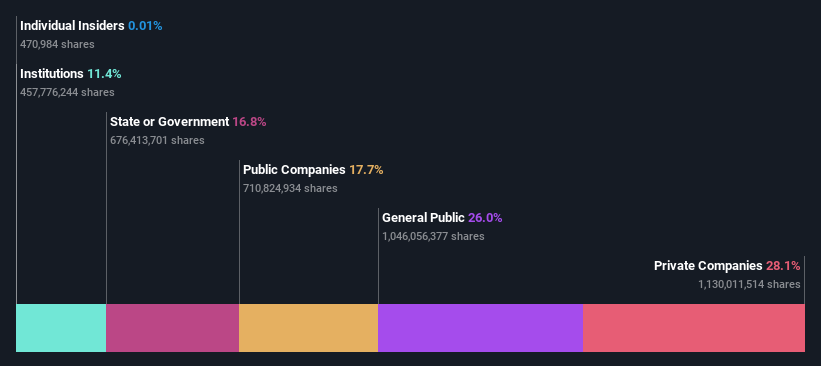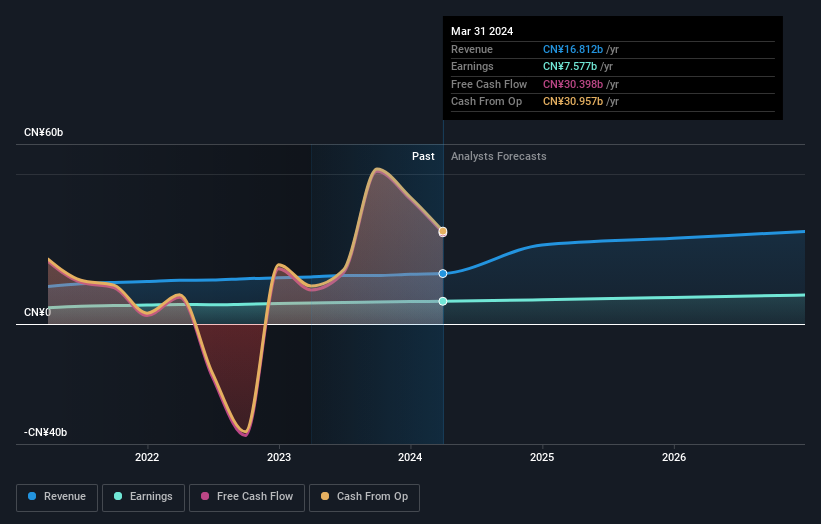Bank of Changsha Co., Ltd. (SHSE:601577) stock most popular amongst private companies who own 28%, while individual investors hold 26%

Key Insights
- Bank of Changsha's significant private companies ownership suggests that the key decisions are influenced by shareholders from the larger public
- The top 7 shareholders own 51% of the company
- 11% of Bank of Changsha is held by Institutions
To get a sense of who is truly in control of Bank of Changsha Co., Ltd. (SHSE:601577), it is important to understand the ownership structure of the business. And the group that holds the biggest piece of the pie are private companies with 28% ownership. That is, the group stands to benefit the most if the stock rises (or lose the most if there is a downturn).
And individual investors on the other hand have a 26% ownership in the company.
Let's delve deeper into each type of owner of Bank of Changsha, beginning with the chart below.
See our latest analysis for Bank of Changsha

What Does The Institutional Ownership Tell Us About Bank of Changsha?
Many institutions measure their performance against an index that approximates the local market. So they usually pay more attention to companies that are included in major indices.
As you can see, institutional investors have a fair amount of stake in Bank of Changsha. This suggests some credibility amongst professional investors. But we can't rely on that fact alone since institutions make bad investments sometimes, just like everyone does. It is not uncommon to see a big share price drop if two large institutional investors try to sell out of a stock at the same time. So it is worth checking the past earnings trajectory of Bank of Changsha, (below). Of course, keep in mind that there are other factors to consider, too.

Hedge funds don't have many shares in Bank of Changsha. Our data shows that Changsha Municipal Bureau Of Finance is the largest shareholder with 17% of shares outstanding. For context, the second largest shareholder holds about 12% of the shares outstanding, followed by an ownership of 5.7% by the third-largest shareholder.
We also observed that the top 7 shareholders account for more than half of the share register, with a few smaller shareholders to balance the interests of the larger ones to a certain extent.
While it makes sense to study institutional ownership data for a company, it also makes sense to study analyst sentiments to know which way the wind is blowing. There are a reasonable number of analysts covering the stock, so it might be useful to find out their aggregate view on the future.
Insider Ownership Of Bank of Changsha
While the precise definition of an insider can be subjective, almost everyone considers board members to be insiders. Company management run the business, but the CEO will answer to the board, even if he or she is a member of it.
Insider ownership is positive when it signals leadership are thinking like the true owners of the company. However, high insider ownership can also give immense power to a small group within the company. This can be negative in some circumstances.
Our data suggests that insiders own under 1% of Bank of Changsha Co., Ltd. in their own names. We do note, however, it is possible insiders have an indirect interest through a private company or other corporate structure. Keep in mind that it's a big company, and the insiders own CN¥3.7m worth of shares. The absolute value might be more important than the proportional share. It is always good to see at least some insider ownership, but it might be worth checking if those insiders have been selling.
General Public Ownership
The general public-- including retail investors -- own 26% stake in the company, and hence can't easily be ignored. This size of ownership, while considerable, may not be enough to change company policy if the decision is not in sync with other large shareholders.
Private Company Ownership
It seems that Private Companies own 28%, of the Bank of Changsha stock. Private companies may be related parties. Sometimes insiders have an interest in a public company through a holding in a private company, rather than in their own capacity as an individual. While it's hard to draw any broad stroke conclusions, it is worth noting as an area for further research.
Public Company Ownership
Public companies currently own 18% of Bank of Changsha stock. It's hard to say for sure but this suggests they have entwined business interests. This might be a strategic stake, so it's worth watching this space for changes in ownership.
Next Steps:
It's always worth thinking about the different groups who own shares in a company. But to understand Bank of Changsha better, we need to consider many other factors. Case in point: We've spotted 1 warning sign for Bank of Changsha you should be aware of.
If you are like me, you may want to think about whether this company will grow or shrink. Luckily, you can check this free report showing analyst forecasts for its future.
NB: Figures in this article are calculated using data from the last twelve months, which refer to the 12-month period ending on the last date of the month the financial statement is dated. This may not be consistent with full year annual report figures.
Valuation is complex, but we're here to simplify it.
Discover if Bank of Changsha might be undervalued or overvalued with our detailed analysis, featuring fair value estimates, potential risks, dividends, insider trades, and its financial condition.
Access Free AnalysisHave feedback on this article? Concerned about the content? Get in touch with us directly. Alternatively, email editorial-team (at) simplywallst.com.
This article by Simply Wall St is general in nature. We provide commentary based on historical data and analyst forecasts only using an unbiased methodology and our articles are not intended to be financial advice. It does not constitute a recommendation to buy or sell any stock, and does not take account of your objectives, or your financial situation. We aim to bring you long-term focused analysis driven by fundamental data. Note that our analysis may not factor in the latest price-sensitive company announcements or qualitative material. Simply Wall St has no position in any stocks mentioned.
Have feedback on this article? Concerned about the content? Get in touch with us directly. Alternatively, email editorial-team@simplywallst.com
About SHSE:601577
Bank of Changsha
Provides various commercial banking products and services to personal and business customers in China.
Very undervalued with flawless balance sheet and pays a dividend.

